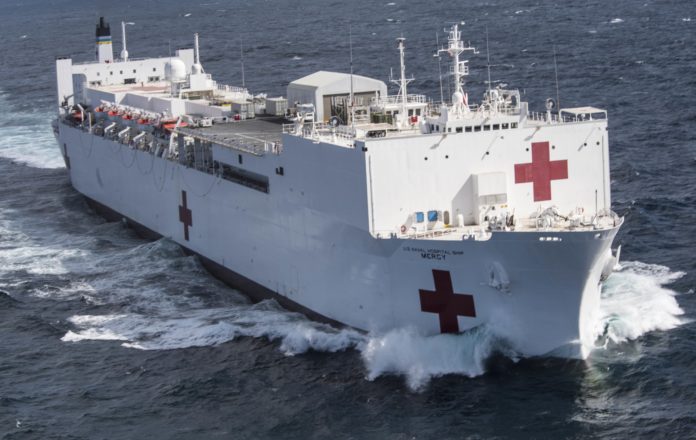This post has been updated with statements from Secretary of Defense Mark Esper.
The Pentagon is starting the process of activating Navy hospital ships USNS Mercy (T-AH-19) and USNS Comfort (T-AH-20) as part of the Defense Department’s domestic response to the spreading COVID-19 virus, USNI News has learned.
“We’ve already given orders to the Navy… to lean forward in terms of getting them ready to deploy,” Secretary of Defense Mark Esper told reporters on Tuesday.
The ships will now begin the several days-long processes of bringing aboard medical staff and equipment ahead of deploying along the East and West coasts, a defense official confirmed to USNI News on Tuesday afternoon.
Two sources told USNI News that the idea was for the ships to provide relief for coastal hospital systems, with the ships taking on non-COVID-19 cases and allowing the hospitals to focus on the most critical patients suffering from the virus. The Pentagon also has extensive equipment for erecting field hospitals in addition to the hospital ships, but those facilities are optimized for trauma cases, with several beds close together, and not for infectious patients.
“So one of the ways you could use field hospitals, hospital ships or things in between is to take the pressure off of civilian hospitals when it comes to trauma cases, to open up civilian hospital rooms for infectious diseases,” Esper said.
On Monday, Joint Staff surgeon Air Force Brig. Gen. Paul Friedrichs gave more details on how the ships could support civilian hospitals.
“If, for example, a community has a large outbreak and there’s a need for emergency room support or trauma support, a hospital ship is perfectly designed to do that,” Friedrichs told Politico on Monday.
“It’s hard to get the hospital ship to St. Louis, but along the coasts, it is an option to use.”
Each ship has a 1,000-bed capacity and is manned by military medical personnel, requiring about a week or more to mobilize that personnel from across the active duty and reserve forces. Pentagon officials have stressed that many of the reserve medical personnel that would be called up to staff mobile hospitals or Mercy and Comfort would be partially pulled from civilian medical facilities.
“The big challenge isn’t the availability of these inventories, it’s the medical professionals. All of those doctors and nurses either come from our medical treatment facilities or they come from the reserves, which means civilians,” Esper said.
“What I don’t want to do is take reservists from a hospital where they are needed just to put them on a ship to take them somewhere else where they’re needed.”
Esper said he’s been in consultation with several state governors on how the military can best support civilian medical efforts.
“The Department of Defense is ready, willing and able to support civilian authorities to the greatest extent possible with the direction of the president,” Pentagon spokesman Jonathan Hoffman told reporters on Monday. “We just want to make sure that the conversation that is being had is informed by the facts of what is possible, what is not, and what those trade-offs are.”
Mercy is homeported at Naval Station San Diego, Calif., while Comfort is at Naval Station Norfolk, Va.





